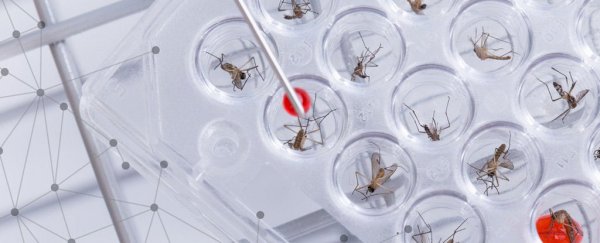Residents in Florida will today help determine whether the first trial of genetically modified (GM) mosquitoes in the US will go ahead – and the outcome could have a huge impact on the state's ongoing attempts to curb Zika virus.
While millions of Americans voting in the presidential election today will help shape the future of the country, residents in Key Haven and Monroe County on Florida's southern tip have an additional responsibility, in deciding whether to allow an unprecedented release of GM insects on American soil.
Voters in Monroe County will be asked: "Are you in favour of the Florida Keys Mosquito Control District conducting an effectiveness trial in Monroe County, Florida, using genetically modified mosquitoes to suppress an invasive mosquito that carries mosquito-borne diseases?"
That invasive mosquito is called Aedes aegypti, and it's the species that transmits Zika virus to humans, in addition to dengue fever, chikungunya, yellow fever, and other diseases.
The aim of the trial, which would be carried out by British biotech firm Oxitec if it goes ahead, is to release millions of genetically modified male mosquitoes into the wild.
When these male GM mosquitoes – which don't bite – mate with the natural population of Aedes aegypti, the offspring accumulates a toxic protein called tTAV (tetracycline repressible activator variant) that kills them before they reach maturity, preventing them from biting or transmitting Zika.
Back in August, the US Food and Drug Administration (FDA) gave preliminary approval to the company to run the trial in Key Haven, when it found that the release of the GM insects would not have a significant impact on the environment.
Oxitec, which was founded in 2002, began developing the technique before Zika virus exploded last year, with the original focus being on reducing Aedes aegypti carrying dengue fever.
The preliminary approval came with an obligation to seek public input on the plan – but while the GM poll being conducted today is non-binding, a majority of board members with the Florida Keys Mosquito Control District have said they'll stand by what the residents vote for, meaning the poll will be decisive one way or the other.
Although the use of GM mosquitoes could be an extremely effective way of combating Zika, local opposition to the trial in Monroe County – especially in the community of Key Haven, where the insects would be released – is significant.
"When I first heard about the technology, I thought it was a really good idea, but as we began to learn more about it, the more questions we had," local resident Mila de Mier, who runs a petition against the trial, told Paul Rincon at the BBC.
"[W]hen you reduce the population of Aedes aegypti, another aggressive mosquito species could come in and become established – like the Asian tiger mosquito," she added. "There's not going to be any agency supervising this."
But Oxitec says similar trials in the Cayman Islands, Panama, and Brazil have shown significant effectiveness in controlling Aedes aegypti, reducing populations by 90 percent or more – although at it's still too soon to tell how this is affecting disease transmission rates.
This compares with the 30–60 percent reductions seen with traditional controls used in Florida, such as pesticides and mosquito traps respectively.
"The aim is to get the same result in the Keys," biotechnologist Derric Nimmo, the head of the proposed Florida trial, told the BBC. "We've had six years of releases, involving millions of male mosquitoes, and there have been no reports of any adverse effects."
The results so far have been promising enough for the World Health Organisation (WHO), which in February acknowledged that the use of GM mosquitoes was one of the ways it was considering tackling Zika on a global front.
While there's still a lot we don't know about the possible long-term effects of this trial on mosquito populations, there are already 1,133 confirmed Zika infections in Florida, meaning something needs to be done to combat this virus and its terrible effects.
What exactly that will be will come down to what the voters of Key Haven and Monroe County decide on today (in addition to a few other things going on in the country right about now).
Watch this space.
